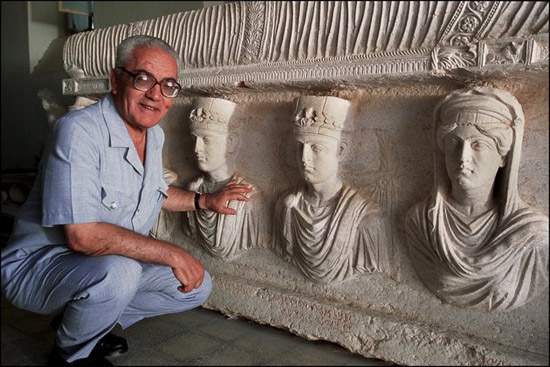A tribute to Khaled Asaad. We dedicate places of culture to the archaeologist who gave his life for Palmyra
It is almost impossible to scroll through bibliographies of texts dedicated to the ancient city of Palmyra and not find a quotation, reference or thanks to Khaled Asaad, the archaeologist who dedicated his entire professional life to the"bride of the desert" and also became director of the Syrian city’s excavations and museum. It was precisely his immense passion and, even more so, his boundless love for Palmyrene antiquities that cost him his life: according to sources from Syria, first quoted by the Guardian and later picked up by newspapers around the world, Khaled allegedly refused to reveal to ISIS the location where the scholar and his entourage had hidden several valuable archaeological artifacts in order to spare them a tragic end, that of being looted to forage for the criminal activities of the self-styled “Islamic State” or to be destroyed. And for this refusal of his, he was barbarously murdered.
The affair has deeply affected us. However, we make no secret of the fact that in writing this article we find ourselves in great difficulty: indeed, any words to comment on what happened seem unsuitable. And what is even more terrible, is that in the face of these misfortunes we feel as if unable to do anything to prevent them. Honestly, we have no answers to the many questions that anyone will have asked themselves upon learning this horrible news. So, we simply say that this man, this great man, offered the whole world a most shining example of courage, love of knowledge and neighbor, and fidelity to his mission. A person who in the face of insensitivity, barbarism and cruelty has opposed his enormous dignity and the conviction that culture is a far more powerful weapon than all the arsenals that exist on Earth. And we realize that we would love to have even an inch of his imposing moral stature.
 |
| Khaled Asaad |
So many today, among colleagues, researchers, archaeologists or people who simply exchanged a few words with him, remember Khaled Asaad as a serious and knowledgeable scholar, one of the leading experts on the antiquities of Palmyra (and if they are saved from the destructive fury, it will be largely because of him), but also as an extremely helpful and open-minded person, and also as a good disseminator: in fact, he had his own Facebook page where he shared information about the excavations, explained artworks and artifacts to his audience, and also posted old photographs that are an important historical record of archaeological activity at the Syrian site. Those who eliminated Khaled Asaad did not calculate the fact that knowledge now has been enriched by the lofty example of a man who sacrificed his life to preserve culture, art, and the evidence of the past.At the risk of being rhetorical, we are more than certain that Khaled Asaad will continue to be alive in the memory of those who knew him, in the studies of those who will continue to deal with Palmyra (because studies will certainly not cease), and in the memory of all.
In these hours, as a sign of respect, Italian museums are displaying flags at half-mast, and many are writing articles or, simply, posting photos of the archaeologist on websites and social networks to honor his memory. The city administration of Pisa has let it be known that the city will dedicate “a significant place for the protection of cultural heritage” to Khaled Asaad. Here, it would be nice if Pisa’s idea would be followed and Khaled Asaad could be honored with the dedication of streets, museum halls, places of culture in general: with this inadequate tribute of ours, we want, as much as we can, to support the efforts of those who will work to remember with dedications of this kind the figure of the scholar. We at Finestre Sull’Arte have decided that in the coming days we will publish a short passage from one of his articles, which we will specially translate into Italian. In the hope that this small contribution will raise awareness of the importance of Palmyra for all humanity. And of the archaeologist who for years cared for her, and who gave his life to save her.
Warning: the translation into English of the original Italian article was created using automatic tools. We undertake to review all articles, but we do not guarantee the total absence of inaccuracies in the translation due to the program. You can find the original by clicking on the ITA button. If you find any mistake,please contact us.




























